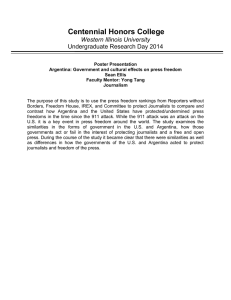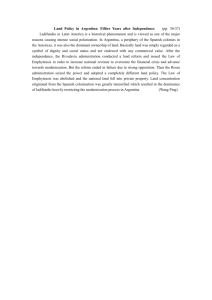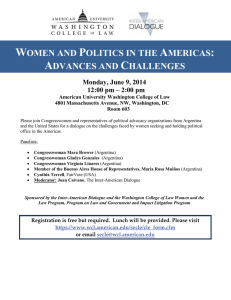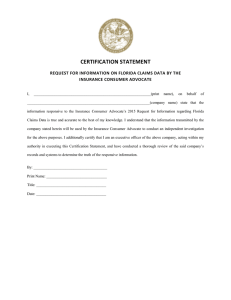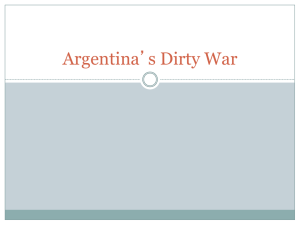Argentina v. Holdout Creditors: Applying the Rule of Law Richard Samp
advertisement
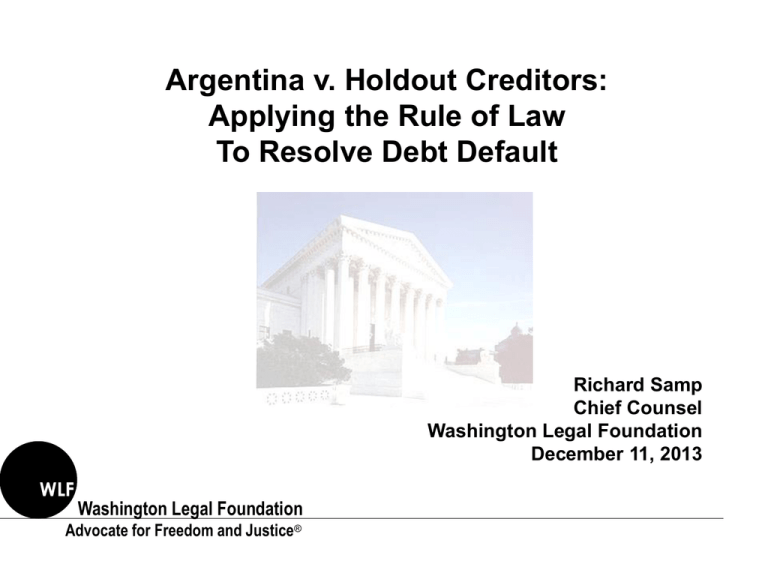
Argentina v. Holdout Creditors: Applying the Rule of Law To Resolve Debt Default Richard Samp Chief Counsel Washington Legal Foundation December 11, 2013 WLF Washington Legal Foundation Advocate for Freedom and Justice® Traditional Rule • Sovereign governments were immune from suit in the courts of a foreign nation • U.S. and European nations used “gunboat diplomacy” to assist their creditors • That option in no longer viable, but creditor won’t lend if it can’t enforce payment, and nations want access to credit markets WLF Washington Legal Foundation Advocate for Freedom and Justice® Foreign Sovereign Immunities Act • Adopted in 1976 to provide clear rules regarding when immunity applies • No immunity for a nation’s commercial activities; per Supreme Court in Weltover, that includes issuing bonds • Nations may waive immunity from suit, but not from debt collection efforts WLF Washington Legal Foundation Advocate for Freedom and Justice® Argentine Default History • Argentina is world-champion defaulter; it has repeatedly defaulted for 200 years • Bonds at issue now were issued in 1994 • In light of its default history, Argentina had to agree to waive all immunity claims and to be governed by New York law WLF Washington Legal Foundation Advocate for Freedom and Justice® The 2001 Default • By 2001, Argentina owed $80 billion and economic downturn prevented payments • In similar situations, most sovereign debtors sit down with creditors and try to negotiate a work-out • Argentina simply announced “moratorium” and did nothing until 2005, by which time it had assets to make substantial payments WLF Washington Legal Foundation Advocate for Freedom and Justice® 2005 Exchange Offer • In 2005, Argentina extended take-it-orleave-it offer: accept “Exchange Bonds” worth less than 30% of old bonds, or get nothing at all. • About 76% of bondholders accepted, and they have been paid interest ever since • Argentina adopted “Lock Law” prohibiting any payments to holdouts WLF Washington Legal Foundation Advocate for Freedom and Justice® The Holdouts Strike Back • Some holdouts filed suit and obtained judgments v. Argentina in S.D.N.Y. • Argentina refused to pay judgments • Efforts to find non-exempt Argentina anywhere in world have been largely unsuccessful (e.g., assets of Argentina central bank, Argentine navy training ship) WLF Washington Legal Foundation Advocate for Freedom and Justice® Pari Passu Clause • Most bond agreements include a provision requiring sovereign debtors not to subordinate the creditor’s debt to debt owed to other creditors • Meaning of such clauses is disputed • S.D.N.Y.: Argentina violated the clause in the 1994 bonds by denying “equal treatment”: paying interest on Exchange Bonds while barring payment to holdouts WLF Washington Legal Foundation Advocate for Freedom and Justice® The District Court Injunctions • March 2012: SDNY injunction bars payments to Exchange Bondholders unless Argentina also pays holdouts • October 2012: 2d Cir affirms but remands for clarification • November 2012: SDNY stands pat • August 2013: 2d Cir again affirms, and grants stay pending cert petition WLF Washington Legal Foundation Advocate for Freedom and Justice® Action in the Supreme Court • Oct. 2013: Supreme Court denies cert petition seeking review of 2d Cir.’s initial affirmance (in Oct. 2012) of injunction • Denial may have been based in part on the preliminary nature of that affirmance • Cert petition from 2d Cir.’s second ruling is due Feb. 2014; with extensions & CVSG, decision on review may not be until 2015 WLF Washington Legal Foundation Advocate for Freedom and Justice® Other Supreme Court Action • Case names are confusing; the lead holdout is NML Capital, Ltd. • Supreme Court may well agree to hear another case named NML v. Argentina, involving document discovery • Solicitor General has recommended that cert be granted in the “discovery” case and says 2d Cir erred in ordering discovery WLF Washington Legal Foundation Advocate for Freedom and Justice® Injunctive Relief Under FSIA • Both “discovery” and “pari passu” cases turn on FSIA limits on injunctive relief • Secs. 1609-1611 provide that property of foreign sovereign is immune from attachment or execution unless it is commercial • Question: does SDNY injunction amount to attachment of Argentine property? WLF Washington Legal Foundation Advocate for Freedom and Justice® Other Issues • Did the district court properly interpret pari passu clause? Supreme Court unlikely to address that issue of NY contract law • Will the injunction hamper renegotiation of other sovereign debt? 2d Cir. didn’t think so, given Argentina’s uniquely recalcitrant status, and the historical ability of negotiators to get past “holdout” issues WLF Washington Legal Foundation Advocate for Freedom and Justice®
